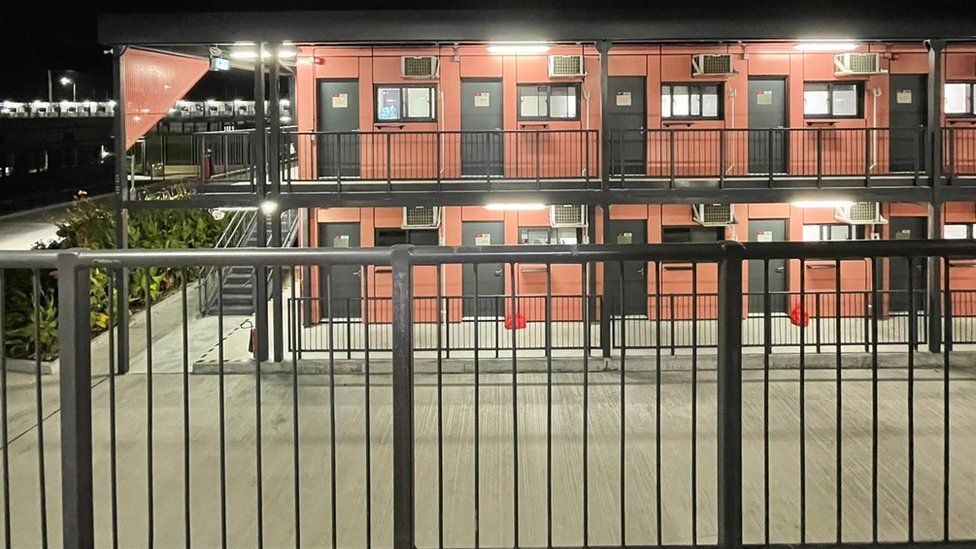Hong Kong Covid: The Cathay pilots stuck in 'perpetual quarantine'
Hong Kong is one of the world's biggest aviation hubs but also has some of the strictest coronavirus regulations in the world. Two pilots tell the BBC how these rules are affecting their mental health and putting a strain on their personal lives.
"You're just in a perpetual state of quarantine."
Pierre*, a pilot with the city's flagship carrier Cathay Pacific, has spent almost 150 days in isolation in this year alone, he says.
Though Hong Kong has recorded barely any local coronavirus cases in recent months, the city has imposed an extensive testing and quarantine regime, in line with mainland China's zero Covid policy.
Pilots are not exempted from these rules - which means they spend an exceptionally large portion of their time either working or in quarantine.
These tough measures start at the airport.
All international inbound travellers have to take Covid-19 tests on arrival at Hong Kong airport and quarantine even if they test negative. They need to wait for their test results - which are made available on the same day - before they can proceed with immigration procedures.
"[Aircrew] have been on an aeroplane for upwards of 25 hours, sometimes closer to 30 hours if there are any delays," says Clark*, another Cathay Pacific pilot.
"They have to sit on a plastic chair and can't sleep, waiting for the tests. The whole process takes about four hours from the time you've landed to the time you get home."
If they test negative, they get to go home - but they're still not free.
In the first three days after arriving in Hong Kong, aircrew must remain at home. They can only leave for a maximum of two hours a day, and only to get tested for Covid or for essential activities.
Crew members then have to "avoid unnecessary social contact" for a further 18 days and continue daily testing.
"I don't think this is in any way fair or justified," said Clark. "Totally unacceptable."
When the pilots test positive, or in Pierre's case, are marked as a close contact of a positive case, they will be sent to hospital or a quarantine facility - like the controversial Penny's Bay centre that has been criticised for its living conditions.
Pierre said being in Penny's Bay was like being in "solitary confinement" in a cramped room that "got zero sun".
"I couldn't even see any plants, not a single blade of grass," he said.
The families of positive cases and close contacts have also been forced to stay at the facility, and they have included children and pregnant women.
Foreign aircrew flying into Hong Kong are also subject to these rules. Following reports that more British Airways crew were being quarantined at Penny's Bay, the airline recently suspended flights to Hong Kong saying they were "reviewing operational requirements for this route".
But the restrictions don't end even when the Cathay pilots are overseas. Aircrew have to stick to the airline's strict isolation rules while on layovers in other countries.
"You go directly from your room to the aeroplane. Fly, and then go directly back to your room and you're locked up in your room until you leave again," said Pierre.
Once at the hotel they must stay in their room for the duration of the layover, including meal times.
"Food gets delivered to your room, you open your door, get the food, eat it in the room by yourself," he said.
"There's a security guard outside your door. So you, literally, can't step into the hallway. We are in quarantine from when we show up at work until we get back to Hong Kong."
Resignation and retirement
In response to a request for comment on the pilots' grievances, Cathay Pacific reiterated its support for the Hong Kong government's quarantine measures, saying: "The safety and wellbeing of our customers, employees and the community remain our absolute priority.
"We regularly remind our aircrew of the critical importance of complying with anti-pandemic measures both in Hong Kong and overseas."
On the conditions at Penny's Bay quarantine centre, Cathay Pacific said it was doing its best to "help everyone affected", reiterating that Penny's Bay is a "designated government facility".
"We have scaled up our support, drawing on resources from across the group to get everything from electrical appliances, amenities and additional food supplies to those in the facility to help make their stay as comfortable as possible."
Cathay Pacific said that it acknowledges the "burden" that had been placed on their aircrew.
"A pilot who feels unfit to fly in any way can express that to the management team without jeopardy and is legally protected in their right to declare themselves unfit for duty," the company said.
The airline also said that in recent weeks it had seen an impact on "current sentiment" in how aircrew felt about their jobs.
But this is cold comfort for some employees. The Cathay pilots told the BBC that they have applied or plan to apply for stress leave due to the impact their jobs have have had on them psychologically and the strain put on their personal lives.
"It's almost a certainty that I'll be resigning in the spring... I'm leaving without an actual job and just resigning," said Clark.
"I would say, probably, 80% of those that I fly with are actively looking for work elsewhere... It's all we talk about."
https://www.bbc.com/news/business-59370672





Post a Comment